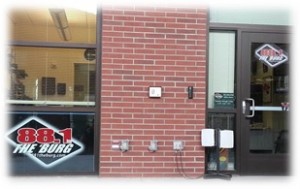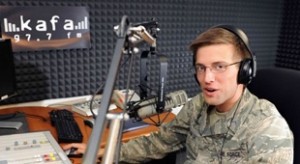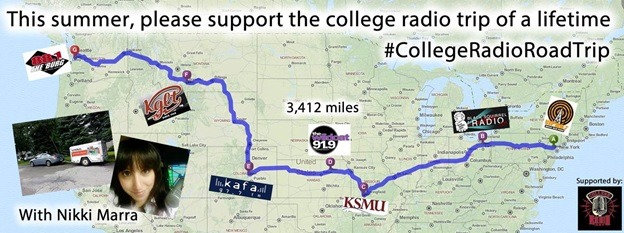Last summer, after 10 years in commercial radio, Nikki Marra accepted the job of Professional Program Director at KCWU-FM, Central Washington University’s student station. The school was looking to revamp the program and possibly expand their Audio and Radio curriculum. Marra already had a Master’s Degree in Broadcasting and had been teaching courses in Audio and Radio for four years. She was also an Advisory Board Member for College Radio Day at the time.
 It’s a familiar radio story as Marra rented a U-Haul, preparing to drive cross-country. But to prepare for her new position, she decided to take a non-traditional route and stop at as many college stations as she could along the way. At each stop, she met with students talking with them about their motivation for involvement with the student station.
It’s a familiar radio story as Marra rented a U-Haul, preparing to drive cross-country. But to prepare for her new position, she decided to take a non-traditional route and stop at as many college stations as she could along the way. At each stop, she met with students talking with them about their motivation for involvement with the student station.
Over the course of her road trip, Marra’s focus shifted from merely researching the world of college radio. She discovered an alarming trend. Some of these stations were in the process of being shut down, and some universities were selling off licenses for reasons that ranged from funding issues to a lack of belief in radio.
Marra decided to turn the interviews into an audio documentary called “The College Radio Road Trip,” which addresses the college radio dilemma.
It was distributed to every station that took part in College Radio Day and recently won a 2015 New York Festivals International Radio Program Award. The festival, which honors work in radio broadcasting, receives entries from radio stations, networks and independent producers in 32 countries, putting Marra in some rarified air space.
This project and its larger purpose make it a great example of innovativeness. A Nikki points out, many broadcasters don’t think about college radio very often, even though many of us got our start behind the board at our school’s FM or even carrier current station. And they continue to be the nucleus of the farm team that we so often overlook…until it’s time to find that next great jock or salesperson.
We asked Nikki to share her thoughts about the road trip experience, along with her views on the state of college and commercial radio, in this week’s edition of Radio’s Most Innovative.
JM: What was the goal of making “The College Radio Road Trip?”
NM: To be honest the goal changed over time.
Going into the project, I was motivated to see what each staff’s purpose for participating at their college radio station was. I had experience from working at my own college radio station, WPSC – the home of College Radio Day. But that’s where my experience ended, and I wanted to compare and contrast the differences within the college radio community before I started my new job.
I discovered a couple of other much more important issues. One being that college radio stations are being shut down, or their FCC licenses are being sold off by universities that either aren’t able to afford the station or view it as a hobby instead of a learning laboratory.
The other issue is that each college station operates with its own standards. This is a problem for training future broadcasters because there is no entity overseeing the recruitment, training or placement of students going into, through and out of college radio stations. If college radio stations aren’t taking themselves seriously, they can’t expect the school administrators to.
JM: What were some of the biggest differences between the different radio stations you profiled?
NM: Every station seems to have the same basic equipment setup, but the level of and standard of that equipment changed from place to place. Also, the hierarchy of how each station runs is different. Some have professional staff with student employees; others are all students with an advisor or grad assistants. But by far, the biggest difference is funding. If you want to hear more about that, you’ll have to listen to the documentary.
JM: Were there any similarities across these college radio stations?
NM: College radio, like radio in general, is a fraternity. It was summer when I traveled through these states and none of these stations were off the air. They were fully functioning, run by students who wanted to spend their summer vacation in the studio. No one was ever at a loss for words about how much they care about their radio program, about the next great bit idea, or how college radio changed their lives forever. That is something very special.
JM: How serious a crisis is the survival of college radio stations?
NM: That depends on who you ask. Commercial radio might be able to survive without college stations. But some people think the radio is is eroding. Maybe that’s because we haven’t given them enough reasons to listen. Every day I impress upon my students the importance of content. And at 17, 18 or 19 years-old, they are creating better content than some radio veterans. That’s instruction they might not get if they weren’t part of this radio station. If we want radio to survive and grow, we need to invest in young, creative, innovative future broadcasters.
JM: Do you feel commercial and public broadcasters have a sense of the difficult road that many college radio stations are on?
NM: Of course there are always exceptions, but as a whole, I don’t think commercial broadcasters give much thought to college radio. There seems to be a serious disconnect, even though many professional broadcasters started at a college station. It would behoove major media conglomerates to invest in college media since that is likely the pipeline their future talent will be coming from.
JM: Have you considered creating a similar piece about commercial radio?
NM: I would hope influential people in commercial radio would listen to this documentary. You see, the reason I left commercial radio to mentor students isn’t because I don’t believe in it. It’s because I think commercial radio doesn’t believe in young talent anymore. My hope is that, after making this documentary, there will be more attention paid to the idea that college radio needs best practices for training so commercial stations don’t view young broadcasters as a liability.
Conversely, young broadcasters are working part-time at two or three stations to make ends meet because entry level full time radio jobs don’t seem to exist. That is a huge epidemic that is ruining our industry. Young talent feel like they are being taken advantage of, burning out and leaving radio instead of feeling empowered and believing there is room to grow in the industry they love.
JM: Do you still see passion from young people for radio?
NM: I read this question aloud to my students who all started hooting and hollering and yelling out reasons why they are passionate about radio. I wish I had it on tape. These students never cease to amaze me. They show up for every event, want to learn new things, take pride in their craft, and are fearless when it comes to broadcasting. I am in constant awe of their willingness to push themselves to be better.
be better.
JM: How do they view the industry: career path or a college hobby?
NM: My experience at KCWU-FM (88.1 The ‘Burg) is that students are very eager to have a radio broadcasting curriculum. They want to legitimize what they are learning on an academic level in hopes that will help them turn it into a viable career.
Of course, we have volunteers from all different academic disciplines and they are just as important as broadcasting majors. Every student learns valuable life and career tools that will help them in whatever job they choose to go into. But it’s important to give the ones who want to go into radio every possible tool.
JM: What area does commercial radio need to focus on in order to improve itself through innovation?
NM: In my opinion, the inability or unwillingness to take risks in programming for fear of failure is what is keeping radio at a standstill. The belief that radio is a craft and not just a business needs to be ingrained in commercial broadcasters. We’ve forgotten that product is king.
We need to invest in programming that feeds that belief. Producers and air talent need to be multimedia content creators, developing programming audiences want to tune into.
 JM: What was the most memorable moment during your travels to the various stations?
JM: What was the most memorable moment during your travels to the various stations?
NM: My visit to KAFA at the United States Air Force Academy in Colorado was unique. Even entering the base was a challenge, since I had to go through security with my car and U-Haul. The station is run by cadets who I spoke with about their reasons for joining the radio station. Needless to say, none of these cadets will be going into broadcasting, so their reasons for being involved were very interesting.
JM: Did you ever expect to win an award?
NM: I never think about awards. I really wasn’t until I started pushing my students to submit their work for awards that I realized if I was asking them to do it, I should be a good example.
JM: What advice do you have for young people trying to start careers in radio?
NM: Radio is about passion. If you don’t love it, don’t do it. You’ll end up resenting yourself, your bosses, your company, and being miserable. But if you love it, do it. Grab on to it and don’t let it go.
JM: What suggestions do you have for someone with a big idea that isn’t sure how to get started?
NM: If you’re not sure where to start, ask questions. I was always afraid to ask people questions for fear of looking stupid, but now I love it when my students ask questions. So either ask a lot of questions or blaze your own trail through trial and error. But at least try. Always try!
Thanks to Mike Stern for writing this week’s RMI. You can listen to “College Radio Road Trip” here.
INNOVATION QUOTE OF THE WEEK
“The future belongs to young people with an education and the imagination to create.”
President Barack Obama
More of Radio’s Most Innovative
- Radio’s Most Innovative: NPR’s “Car Talk”/Doug Berman
- Radio’s Most Innovative: Jeff Smulyan/WFAN
- Radio’s Most Innovative: PRX’s Podcast Garage
- Radio’s Most Innovative: Paul Lamere
- Best of JacoBLOG – Radio’s Most Innovative: WNIC’s "Pillow Talk" with Alan Almond
- What To Do If Your Radio Station Goes Through A Midlife Crisis - April 25, 2025
- A 2020 Lesson?It Could All Be Gone In A Flash - April 24, 2025
- How AI Can Give Radio Personalities More…PERSONALITY - April 23, 2025






So a university has an FCC license and wants to hand it back because they think the college radio station might just be a “hobby?” Following that logic, what they are saying is, “Our university and its students are no longer interested in serving the public interest, convenience, and necessity.” The kindest possible word I can find to describe that is–misguided.
That it is, and perhaps we need to start taking college radio more seriously. Thanks, Beverlee.
Fred, Excellent as Always! The future of radio is now. Proud that WWUH-FM 6kw University of Hartford turned 47, on July 15. Radio is a life skill connecting everywhere. Hats off to Nikki, Dan V, Vince B & the pros that care about training & Content Development. Plenty of channels to hear…not enough demand listening. “Our Day Will Come” – Ruby & The Romantics, 1963. Safe weekend, Clark.
Thanks, as always, Clark.